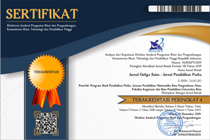PROFILE OF STUDENT PEDAGOGICAL CONTENT ABILITIES INTEGRATED FIELD INTRODUCTION PRACTICE STUDY PROGRAM OF PHYSICS EDUCATION
Abstract
This research aims to describe the profile of pedagogical knowledge (PK) capabilities, content knowledge (CK), and pedagogical content knowledge (PCK) of physics students who are conducting integrated field recognition practices (PPLT). This research is qualitative descriptive research, where all data are collected based on facts obtained in the field, so descriptive data were obtained from respondents who were selected. The research subjects involved 6 physics education students who conducted PPLT at school as respondents. The selected category is based on a cumulative achievement index. The selected respondents were 2 high ability students, 2 medium students, and 2 low ability students. Data obtained through pedagogical knowledge observation sheets, content knowledge tests, and pedagogical content knowledge observation questionnaires. The data was taken from PPLT student learning compilation in schools. Based on the results of research on the ability of PK, CK, and PCK PPLT physics education students obtained, that students who have high PK and CK abilities have high PCK abilities, while students who have PK abilities and low CK abilities also have high PCK abilities.
Keywords
Full Text:
PDFReferences
Adi P. M.J., Widodo, A., & Sopandi, W. (2017). Science teachers' pedagogical content knowledge and integrated approach. IOP Conf. Series. Journal of Physics: Conf. Series 895.
Agustina, P. (2015). Pengembangan pedagogical content knowledge mahasiswa calon guru biologi FKIP Universitas Muhammadiyah Surakarta Melalui Simulasi Pembelajaran. Jurnal JPPI, 1(1), 1-15.
Depaepe, J.K. (2018). General pedagogical knowledge, self-efficacy and instructional practice: Disentangling their relationship in pre-service teacher education. Teaching and Teacher Education, 69, 177- 190.
Eggen P., & Kauchak, D. (2012). Strategi dan model pembelajaran mengajarkan konten dan keterampilan berpikir, Edisi keenam. Jakarta: PT. Indeks Permata Puri Media.
Evens M., Elen J., & Depaepe, E. (2015). Developing pedagogical content knowledge. Developing lessons learned from intervention studies, Review Article Education Research International.
Garritz & Andoni. (2010). Personal reflection: Pedagogical content knowledge and the affective domain of scholarship of teaching and learning. International Journal for the Scholarship of Teaching and Learning, 4(2).
Indrawati & Sutarto. (2016). Studi pedagogical content knowledge mahasiswa calon guru fisika. Seminar Nasional Pendidikan, Peran pendidikan, sains, dan teknologi dalam membangun intelektual bangsa dan menjaga budaya nasional di era MEA.
Koehler, M.J., Mishra, P., Kereluik, K.T.S., Shin, & Graham, C.R. (2014). The technological pedagogical content knowledge framework. InJ. M. Spector et al (Eds), Handbook of Research on Educational Communications and Technology. New York: Springer Science. pp. 101-111.
Imaduddin, M., Hidayah, F.F., & Astuti, A.P. (2014). Deskripsi pedagogical content knowledge guru kimia menggunakan komponen model pentagon. Universitas Muhammadiyah Semarang. Jurnal Pendidikan Sains, 02.
Ozdemir, B.G., Sahin, O., Basibuyuk, K., Emrullah, E.E., & Yasin, S.Y. (2017). Development of pedagogical content knowledge of classroom teachers on the numbers in terms of two components (IJRES). International Journal of Research in Education and Science, 3(2).
Rahmadhani, Y., Adi, R., & Widi, P. (2016). Pedagogical content knowledge (PCK) guru dalam pembelajaran biologi SMA di kota Cimahi. Prosiding Seminar Nasional Sains dan Pendidikan Sains, 6, pp.17–24.
Setiawan, U., Maryani, E., & Nandi. (2018). Pedagogical content knowledge (PCK) geography teacher high school. Journal of Scientific Social Sciences, 4(1), 12-21.
Sholihah, M., Lia Y., & Wartono. (2016). Peranan TPACK terhadap kemampuan menyusun perangkat pembelajaran calon guru fisika dalam pembelajaran Post-Pack. Jurnal Pendidikan, EISSN: 2502-471X. 1(2, 144-153.
Shulman, L.S. (1986). Those Who Understand: Knowledge growth in teaching. Educational Researcher, 15(2), 4-14.
Shulman, L.S. (1987). Knowledge and teaching: Foundations of the new reform. Harvard educational review, 57(1), 1-23.
Solihat, A.N., Suminawati, & Afriza, E.F. (2019). Implementasi pedagogical content knowledge (PCK) dalam meningkatkan kemampuan kognitif siswa. Jurnal Ekonomi Pendidikan, 7(1), 69-76.
Sukaesih, S., Ridlo, S., & Saptono, S. (2017). Profil kemampuan pedagogical content knowledge (PCK) calon guru biologi. Jurnal Lembaran Ilmu Kependidikan. 46(1).
Suryawati, E., Firdaus, L.N. & Hernandez, Y. (2014). Analisis keterampilan technological pedagogical knowledge guru biologi SMA kota Pekanbaru. Jurnal Biogenesis, 11(1).
Wati, S., Fitriana, & Mardiyana. (2018). Technological pedagogical content knowledge of junior high school mathematics teachers in teaching linear equations. IOP Conf. Series: Journal of Physics: Conf. Series. 1008 012067.
Widodo, A. (2017). Teacher pedagogical content knowledge (PCK) and students’ reasoning and wellbeing. IOP Conf. Series: Journal of Physics: Conf. Series 812.
DOI: http://dx.doi.org/10.31258/jgs.8.1.9-16
Refbacks
- There are currently no refbacks.
Copyright (c) 2020 Muslimin Muslimin

This work is licensed under a Creative Commons Attribution 4.0 International License.
Jurnal ini terdaftar dan terindeks pada:
- Crossref
- Google Scholar
- Crossref
- Garuda
- Sinta
- Researchgate
- Dimensions
- Base
- Scilit
- OneSearch
- Road
- CiteFactor
- ResearchBib
- WorldCat



















